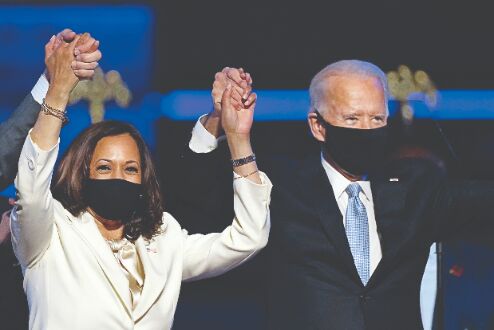Biden for India?
Owing to his close relationship with India under Obama, US President-elect Joe Biden is expected to further solidify Indo-US ties — with the exception of some notable areas of friction

The victory of the 77-year-old Democratic nominee Joseph Robinette Biden as the US 46th President in one of the most contentious elections in the history of America is an expression of confidence in him. It is pertinent to know and analyse what his presidency would mean to India's relations with the US. India-US ties have been as good as they are today. Under the outgoing President Donald Trump the relationship between the two countries has grown even closer and at a more rapid pace in almost all areas of mutual interests and concerns.
Biden is a familiar face in India as he was Barack Obama's Vice-President for two terms. He has been a strong supporter of deepening US ties with India even before he became the Vice President in the Obama administration. Biden may disagree with his predecessor on most issues but he is likely to continue building a stronger relationship with India like Trump.
There is unlikely to be a drastic change in the trajectory of the bilateral relationship, bolstered by bipartisan support in Washington and favoured by exigency — given the US's power competition with China
A policy paper released by the Biden campaign during the election said his administration would place a high priority on strengthening the Indo-US ties by pushing India to become a permanent member of the UN Security Council, continuing cooperation on terrorism, climate change, health and trade.
He played a lead role, both as Chairman of the Senate Foreign Relations Committee and as Vice President in the Obama administration in systematically deepening strategic engagement, people to people ties and collaboration with India on global challenges.
By becoming the US President, Mr Biden has an opportunity of fulfilling his 14-year-old dream to strengthen the India-US ties that he wants to achieve in 2020. In 2006, three years before he became Vice President he had announced in his vision for the future of
US-India relations saying
"My dream is that in 2020, the two closest nations in the world will be India and the United States."
While it would not be possible for him to realise this in 2020, he can definitely achieve it during his presidency starting on January 20, 2021. He also worked to make that vision a reality, including the charge in Congress, working with Democrats and Republicans to approve the US-India Civil Nuclear Agreement in 2008.
According to the policy paper, Biden will deliver on his long-standing belief that India and the US are natural partners and his administration will place a high priority on continuing to strengthen the US-India relationship.
"No common global challenge can be solved without India and the US working as responsible partners. Together, we will continue strengthening India's defence and capabilities as a counter-terrorism partner, improving health systems and pandemic response, and deepening cooperation in areas such as higher education, space exploration and humanitarian relief," the document said.
Although the Obama administration strengthened cooperation with India to fight terrorism in their countries and across the region, there is not much Biden had said at that time on Pakistan-sponsored terrorism. India would certainly like to see that Biden carries forward the legacy of the US administration's approach on India-Pakistan when it comes to cross-border terrorism.
"As the world's oldest and largest democracies, the US and India are bound together by our shared democratic values: fair and free elections, equality under the law and the freedom of expression and religion. These core principles have endured throughout each of our nations' histories and will continue to be the source of our strength in the future," the policy paper said. Defence, strategic and security relations are likely to continue without much change
It was during Obama-Biden administration that the US named India a Major Defence Partner — a status approved by the US Congress — which made it easier to share advanced and critical technology with India to strengthen defence ties. This was significant as it was for the first time that any country was given his status, outside of the traditional alliance system of the US.
With regard to China, with whom India is having deepening border conflict, team Biden is divided in its approach towards Beijing. This could have implications for US-India relations. Some of his advisers have taken a hard stand against China like Trump while others say it is difficult to disentangle the US and Chinese economies.
The Trump administration has been extremely vocal in supporting India over the border standoff with China. India will expect a similar approach from the Biden administration. "A Biden administration will also work with India to support a rule-based and stable Indo-Pacific region in which no country, including China, is able to threaten its neighbours with impunity," the policy document said.
The issue of immigration and visas for Indians, especially H1B visas for skilled professionals, has been a major concern for Indians under the Trump administration. With Democrats being seen to be more liberal towards immigration, the Biden administration is expected to be softer towards Indians who go to the US.
Trade is another issue between India and the US. Some other areas of friction between India and the new US administration could be India's pending review by the US Commission on International Religious Freedom where Democratic party leadership including Kamla Harris, Biden's Vice-President-elect, and other Democrat Congress members Mark Warner, Parmila Jayapal have been vocal on the situation in Jammu and Kashmir, the Citizenship (Amendment) Act, communal violence and media freedoms. Trump had overlooked most of these. But with Democrats in power, India can expect some tough statements from the Biden administration.
The writer is a former Editor of PTI and served as the West Asia correspondent for the same. Views expressed are personal



